
by Lori Vande Krol | Dec 19, 2022 | General Productivity, Goals and Priorities, Habits, Planning, Time Management
How has 2022 been for you? What went well? What could be improved? Did you reach your business and life goals? What will you do differently next year to grow further?
Before you do 2023 annual planning, it is a valuable exercise to close out the year and prepare for the new one by reviewing your goals, habits, and routines. Follow the steps below to review and reset for continued success.
1. Reflect
Look back on the past year and answer reflection questions such as:
- What did I accomplish this year?
- What am I proud of?
- What am I thankful for?
- What should I celebrate?
- What will I continue to do that contributed to my success?
- What were my challenges this year?
- What could/would I have done differently?
- What is one thing I could do to improve next year?
Set aside focused time to write your answers to these questions. You may be surprised at what you learn about yourself, your systems and habits, and how to address challenges in the upcoming year.
For example, during my Year in Review, I realized I am not diligent about scheduling time into my calendar at the beginning of each week for the “important but not urgent” tasks and projects. I, therefore, have not made the progress I wanted on many of these projects. I need to create a routine of setting aside time each week, just as I do with my exercise, before I build in other tasks and appointments. This will now be part of my planning process for 2023.
2. Review Your Annual Goals
The second step in your Year in Review is to review the status of your current year annual goals – both professional and personal. What goals are complete? What contributed to that success? Do you have goals that are not complete, or were not even started? If so, what challenges prevented their completion? Or perhaps there was a change in priority or focus during the year. Determine which of these goals should remain for the upcoming year and write any notes to carry into your 2023 annual goal setting.
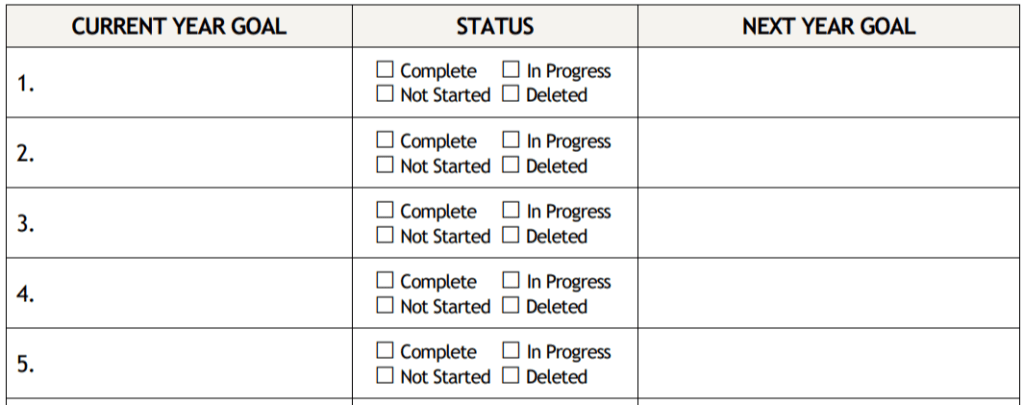
3. Analyze Your Habits and Routines
How did you do on your goals and progress related to your defined habits this year? Review your habit tracking tables and schedule time to reward yourself for any goals reached. Will these habits continue or grow?
For those habits that were a struggle, analyze the reasons and what needs to change in the upcoming year. Do you understand the deeper “why” for the habit? Do you have the right tools in place? Do you need an accountability partner or coach? Determine the habits you will stop, continue, or update for the upcoming year.
Similarly, review your current routines (or routines you had hoped to establish this year). Look at your morning, start of day, end of day, and evening routines. How are they working for you? Do they need to be adjusted or reset? Establish the routines you would like to implement in 2023.
To help you with your Year In Review, I have created a downloadable template to walk you through the process. Click below to have it emailed to you.
Year in Review Template
FREE DOWNLOAD
You can also find this template, along with other valuable planning exercises and templates, at ProActionPlanner.com. Get them soon as they will only be free until the of the year.
If you’d like assistance with review and reflection, the goal-setting process, or in setting up systems for success, contact Lori at Life Made Simple or schedule your free 30-minute consultation. I’d love to help!
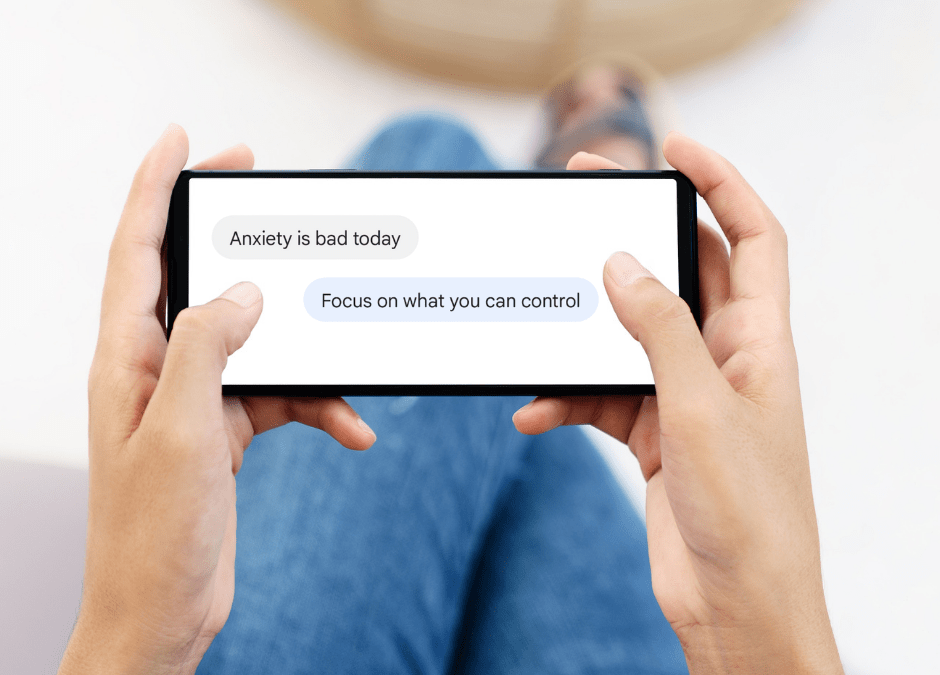
by Lori Vande Krol | Mar 3, 2022 | Goals and Priorities, Habits, Mental Health, Planning, Time Management
My daughter was recently feeling some anxiety at school and texted to let me know. One of the responses I texted back was to “focus on what you can control.” It had an impact, and she decided to post it on social media. The next day she told me it was her most shared post ever – it resonated with many of her followers.
Later that week, a coaching client shared a challenge she had encountered when an unexpected issue arose that stopped her in her tracks. It caused her stress and frustration and caused her to lose many hours of time. As we talked through her reaction to the situation, I asked her, “Looking back, what could you control about the situation at that moment?”, “What was the appropriate reaction?”, “What next steps did you take, or could you have taken?”
With so much out of our control on a daily basis, it’s important to control what we can, be intentional about our thoughts and choices, and act based on this. It’s not always easy but worrying about things we have no control over wastes time and energy and increases stress.
Below are a few tools you might consider to help you focus on those things you can control, so you can better cope with the unexpected and uncontrollable.
Plan
Do you often feel you are constantly reacting to the current “fire” or “squeaky wheel”? Some believe there is no use in planning if things are out of your control anyway. But, this is exactly the reason for it. Planning allows you to gain control over your time and actions in a proactive way. It gives you a better understanding of what is urgent and what is important. Then when the unexpected occurs you can more easily adjust and make intentional choices about if, and how, it fits into your plan. By planning you are making a habit of “focusing on what you can control.”
Stop and Think, Then Act
When the unexpected occurs, or you are feeling anxiety at a certain moment, step back from the situation and ask yourself the following questions:
-
- What can I control about this situation or about what I am feeling?
- Is this my worry or my challenge to handle or does it belong to someone else?
- What specific action(s) can I take to move forward?
Taking a moment to answer these questions will allow you to refocus and transition from being reactive to proactive, allowing for intentional choices about your next thoughts and actions.
Journal
If you are someone who best processes information by writing, take some time to journal your answers to the questions above. Journaling daily on anything that weighs on your mind is a great habit to develop to gain control over your thoughts and actions.
Meditate or Pray
Depending on your spiritual preference, tools such as meditation and prayer can help keep your mind focused and present, along with other benefits. Practicing regularly will help train your mind to react in a more relaxed and focused way when dealing with unexpected and challenging situations. There are many free apps that can help you learn and practice these techniques including Calm, Headspace, and Insight Timer.
What tools or techniques have you found to help you decrease anxiety and stress and focus on the things you can control? Share them in the comments below!

by Lori Vande Krol | Sep 1, 2021 | General Productivity, Goals and Priorities, Habits, Task and Project Management, Time Management
Recently on a beautiful Sunday afternoon, I decided to join my husband for a bike ride. We filled the tires and water bottles, put on our helmets, and headed out. I felt a little extra resistance while peddling up the hill out of our neighborhood and thought, “Ok, this is hard. I think I just need to warm up.” As we pedaled on, I continued to feel that the ride was much more difficult than I expected. I couldn’t keep up with my husband – it seemed even when he wasn’t peddling he was going faster than me – and I was already out of breath. Thoughts that were going through my head during this time included: “I thought I was in better shape than this.” “I work out more than him…why can’t I keep up?” “Is biking really that different than my regular workout?” “What is wrong with me?”
After over three miles of this, it was time to turn back for home. We stopped so I could catch my breath and get a drink of water and my husband said, “Are you sure there isn’t something wrong with your bike? Maybe your tires?” I responded that it felt like it was riding fine and I didn’t hear any strange noises or rubbing, but let me get off my bike and check just to be sure. Lo and behold, the front brake was snug against the tire. I had basically been riding with the brakes on! After a few minutes, I figured out the problem, fixed it, and we rode home in about half the time it took us to get there – a much more enjoyable ride.
What does this somewhat embarrassing story have to do with productivity?
How many times in your life are you pushing against some sort of friction without realizing it? What could be made easier and more enjoyable if you stepped back and really analyzed, and addressed the issue? Often, we are so engrossed in day-to-day life, information, and tasks that we fail to really consider what we are doing. It is vital that we regularly take time to review and reset. In his book Essentialism: The Disciplined Pursuit of Less, Greg McKeown asks “Is there a point at which doing less (but thinking more) will actually produce better outcomes?” My response is “yes”! And my sore legs would agree.
Below are three simple steps you can take to minimize or alleviate the friction in your life and career.
1. Take Notice
Pablo Picasso said, “Without great solitude, no serious work is possible.” It is important to take focused time regularly to review your actions. Are they intentional? Do they reflect your priorities? Are you in control or are you letting others define your schedule and tasks? Are there processes, projects, or tasks that could be done more efficiently or effectively? A regular review might include the following questions:
- What is going well for me? How can I continue this?
- What do I not enjoy? What are my challenges? What can I stop doing? What can be made simpler?
- What do I most enjoy? What do I look forward to? How can I do more of this? What might get in the way?
This reflection is much easier to do if you are clear on your vision, priorities, and plan. For more on this, see my June 2021 blog, Mastering Time Management: What To Do Before the To Do List.
2. Identify the Issue
When you take focused time to reflect and review your priorities and related actions, it becomes simpler to identify any issues that are holding you back, getting in your way, or causing unnecessary friction. Maybe it’s a process, tool, or system that isn’t working optimally. Perhaps a colleague, friend, or family member is causing tension or stress. Or maybe it’s the position, company, or career you are in. It may even be a medical issue that has been overlooked resulting in lower productivity, and higher stress and anxiety.
If you are reviewing systems and processes for a company or team, identifying issues can entail a full-blown workflow analysis to find areas for automation, unneeded duplication, or improvements to technology, training, and communication. More often though, it just takes quiet, focused thought or journaling to pinpoint obstacles towards reaching your goals. Identify them and write them down.
3. Create Change
How will you minimize or alleviate the issues you have identified above? Consider any resources needed to support the change as well as your own habits or actions that need to change. What will you do differently going forward to reduce the friction or obstacles keeping you from success and enjoyment? Making a full plan for success is great, but sometimes you’ll need to just start with one small action step. Then, take another and another. Change can be hard, but the increased joy and success will be well worth it. And, you will likely reach your goals much quicker than you would have otherwise.
As my husband and I drove our bikes back into the garage, we found our daughter waiting for us to leave for her soccer game. Since the bike ride took much longer than expected, we were almost late. I realized then how much the friction I was working against for the first half of the ride impacted more than just me. It also caused stress for my daughter and potentially her team and coach if we were late. While I wish I would have stopped to evaluate the situation sooner, the fact that I did eventually stop to (1) take notice, (2) identify the issue with the brakes, and (3) create change by working to fix it, allowed for a much more enjoyable ride home, and we arrived at pre-game warm-up just in time.

by Lori Vande Krol | Jan 14, 2021 | Goals and Priorities, Habits, Motivation, Task and Project Management, Time Management
If you are like most creative, driven entrepreneurs and professionals, you have a lot of big goals, fun projects, and life-changing ideas on your plate – not to mention the other day-to-day tasks and activities that take up your time. Without a good process for analyzing, prioritizing, and planning, you can become overwhelmed and frustrated that yet another day – or week – goes by without measurable progress. Here I share 3 ways to address this overwhelm so you can reach your big goals quickly and with more focus and less stress, allowing you to share your passions with the world and have fun at the same time.
Success = Skill + Passion + Hard Work
Paul Torrance, Distinguished Professor, researcher, and developer of the Torrance Tests of Creative Thinking, conducted a 40-year longitudinal study of creative individuals. Based on the results of his study, Torrance developed the Manifesto for Children to guide them as they grow and struggle to maintain their creativity and use their strengths to create careers. While Torrance intended his manifesto for children, I think the guidance applies to adults as well.
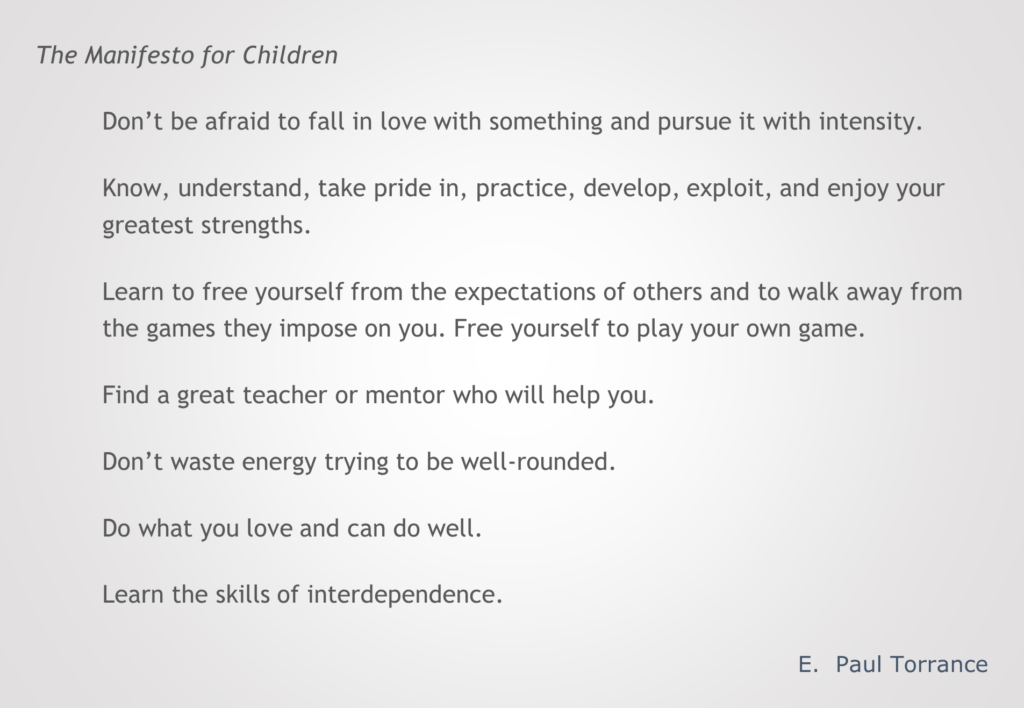
Many of us learn these important ideas later in life, or maybe not at all. Torrance hoped to help improve a creative individuals’ chance of success and life fulfillment with his study and manifesto.
Similarly, you will be most successful and be able to help others more when you focus your time and energy on those things you are good at and passionate about. Big goals take hard work and if you don’t have the knowledge and excitement, you will be much less likely to put in the time and effort required. To narrow down the activities you should be spending your time on, draw the following grid on a piece of paper, and divide your ideas, goals, and activities into these categories:
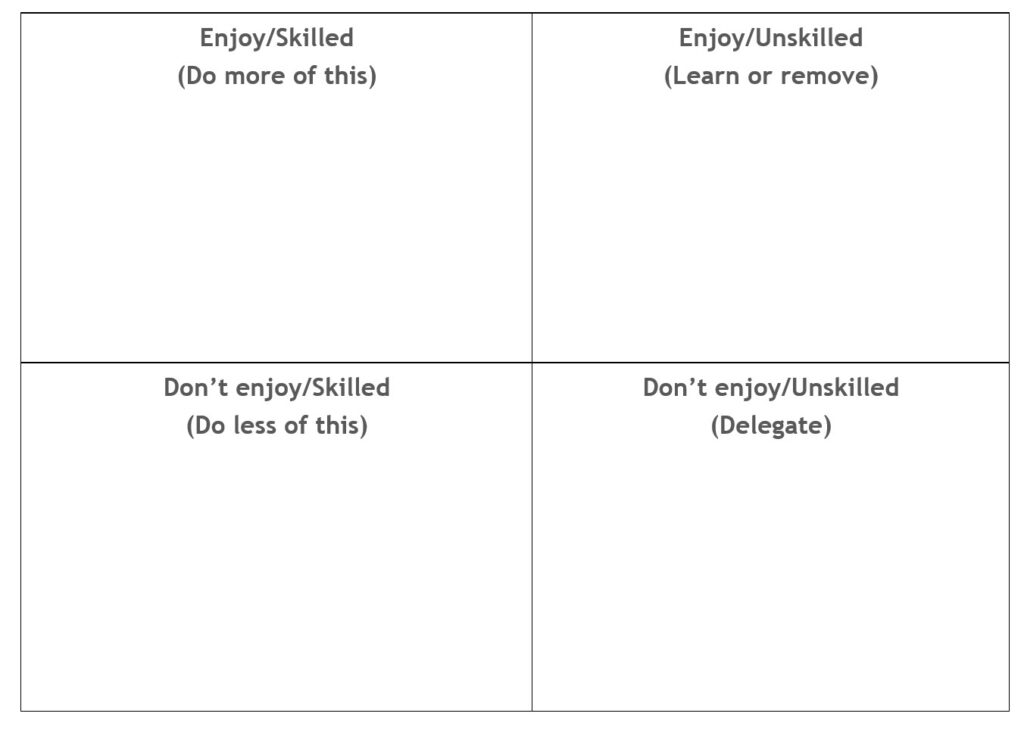
You will want to spend the most time on activities and goals from the top-left “Enjoy/Skilled” quadrant and develop educational or learning goals from the top-right “Enjoy/Unskilled” quadrant. Or, if these activities don’t serve your greater goals, consider removing them. Look at delegating tasks in the bottom half of the grid – those you don’t enjoy – or if possible, remove them. Deleting tasks that don’t serve your greater purpose and goals will open the door for new opportunities.
Determine What To Start, Stop, or Continue Doing
A second exercise that can help you focus on your passions and priorities is the “Start/Stop/Continue” exercise. Write these three words on the top of a piece of paper and list all of those things you would like to start doing, stop doing, and continue doing. If you are a visual person, you might use mind-mapping as a way to brainstorm activities or tasks for each category.
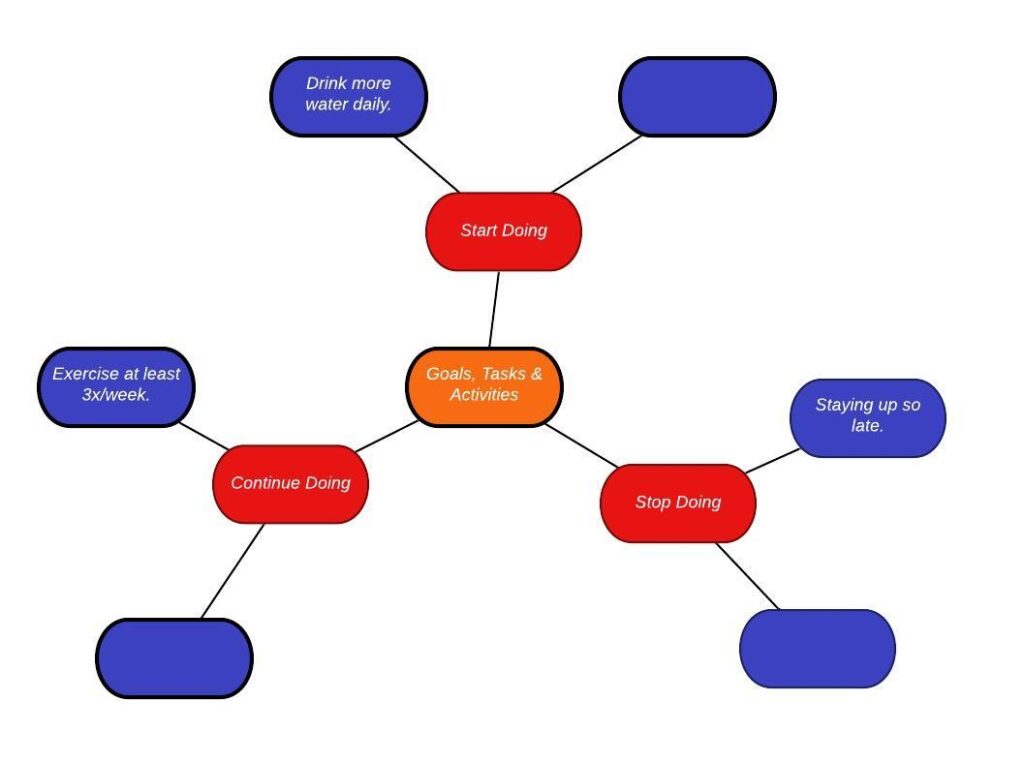
Be realistic when considering your time and energy over the time period considered. This is a great exercise for habit-related activities and goals. For example, in order to have the energy and focus for my big goals, I would like to start drinking more water daily, stop staying up so late, and continue exercising at least 3 days per week.
Find Support and Accountability to Reach Your Goals
Being an entrepreneur, business owner, or leader can be lonely. You want to do great things but may not have someone that understands and shares your passion and drive. Without someone there to communicate your struggles and help get through roadblocks, there may be a loss of momentum or halted progress on your goals. It’s also important to be able to share your excitement when reaching milestones. E. Paul Torrance felt strongly enough about this to include two related items in his Manifesto for Children: “Find a great teacher or mentor who will help you.” and “Learn the skills of interdependence.”
Following are a few different ways you can find this support and assistance:
- An accountability partner. This may be a family member, friend, or colleague, as long as they share your drive and passion and provide the support and encouragement you need through the good and challenging times.
- A mastermind group. The advantage of a formal mastermind group is you have a team of people with different backgrounds, experiences, and skillsets as you work to set and reach your goals. For the best chance of success, I would recommend a paid group with an experienced leader/host.
- A business, life, or productivity coach. Sometimes it makes the most sense to hire a coach to help you get clear on your passions, strengths, and goals and then to help you develop the plan to reach those goals. This person should provide motivation and accountability, be a sounding board as you work through challenges and offer solutions to keep you moving, and be your greatest cheerleader when things go well.
The world needs your big ideas – your book, your product, your new business, your knowledge, your energy, your talent. What will you do to ensure you prioritize, focus, and take action so you can reach your biggest goals?
More blogs related to Priorities, Goal-Setting, and Planning:
Get Unstuck with a Simple Project Plan
Create Your Top 10, and Bottom 10, List
The Superman: Goal Achieved
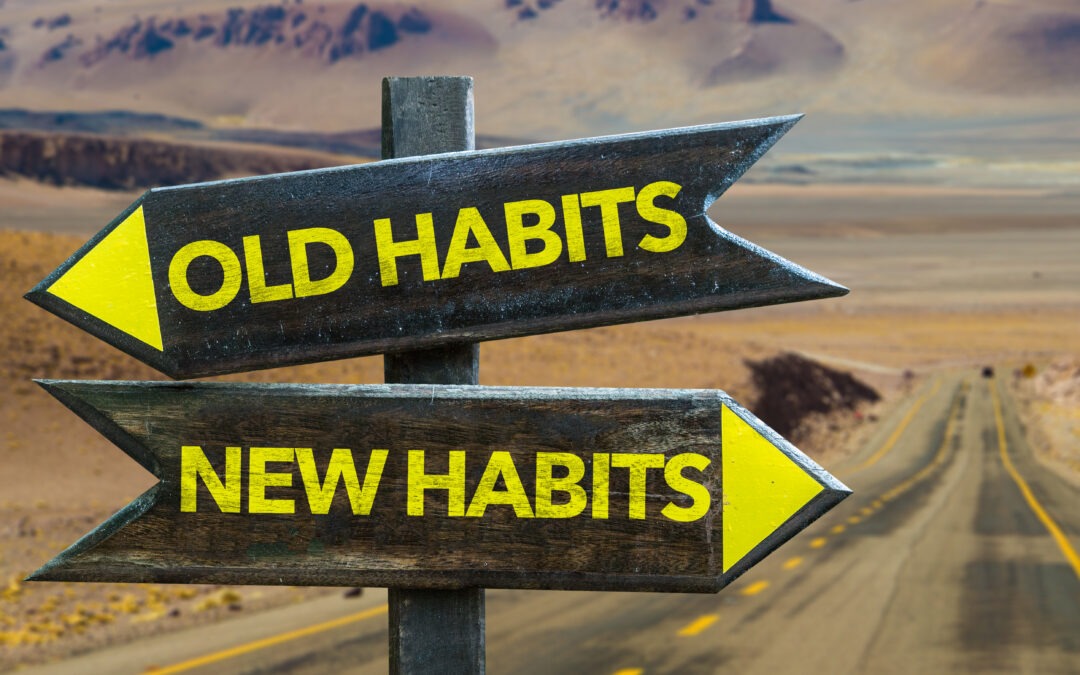
by Lori Vande Krol | Sep 3, 2020 | Goals and Priorities, Habits, Motivation, Procrastination
I have something to confess – I have been a pretty bad cook most of my life. I don’t enjoy it and although I knew my family could be eating healthier, better-cooked meals, I’ve never really had an interest in learning – until recently. For a few reasons I’ll get into later, I decided I would challenge myself to learn how to feed my family in a “cleaner” way. Questions that crossed my mind were: “Where do I start? Do I have the right equipment and tools? Where do I get my groceries? How do I know what “eating clean” means? Will the family like the meals? How much time will it take? Will it even help? How can I change habits after so many years of doing it a different way?” There were a lot of unknowns for me and it was a little scary getting started.
Below I share my process and how you can use this same process to change any habit. It’s never too late to learn and grow!
Know Your “Why” for a Habit Change
Sometimes the most difficult step in changing a habit is deciding to do so. In her book Better Than Before, Gretchen Rubin states “A habit requires no decision from me, because I’ve already decided” (Rubin, 2015, p. 5). But even if you have made the tough decision to work on a habit, change is hard. It’s easy to quit. Things often get harder before they get easier. That is why it is important to be clear about your “why” for learning something new or changing a habit. Your “why” needs to be important enough to drive you to start and to continue when things get rough, which I guarantee they will.
Recently in my work with a client, she shared how she had been struggling with changes in daily working habits. Some days were so mentally draining she would have to take a nap to keep going. We reviewed her “why” and decided she would post a photo or vision board near her desk that reminded her of it daily. Doing this helped her to make better choices, focus her work, and maintain energy to reach her goals.
I have several “whys” for changing the way that I shop, cook, and eat, a few of which include increased food sensitivities in the family, a need to eat well to support exercise and sports, setting a good example for my children to be as healthy as possible, and to challenge myself to learn something new during some Covid-19 related downtime. I was also motivated by the short time I had to put new habits in place before the inevitable craziness that comes with back-to-school activities. All of these “whys” were strong enough priorities to spur me into action and to keep me going on the toughest days.
Research and Find the Best Tools to Support Your Habit
Before choosing the right tools to support your habit, it’s important to be clear on your vision for success and what is needed to help you get there. Will your new habit require enhancements to your current tools and systems or the need for something new? For example, if you are wanting to exercise at home regularly, what type of exercise will help you reach your goals? Do you have the right equipment available?
Or maybe you have decided to create a better habit of planning and scheduling your week. Do you prefer doing so in a paper or digital format? What features does your tool or process need to offer the best chance at success? It is important to analyze your needs and preferences before deciding on the tools that will best support your new habit.
I knew I didn’t have the systems, tools, or knowledge to change our cooking and eating habits on my own. If I was going to be successful, I needed to research and educate myself. I started by Googling “clean eating for families” and reached out to an exercise group I belong to. My research led me to Momables.com and the 30-Day Family KickStart program, which is a 4-week sugar-free, gluten-free, and dairy-free (optional) clean eating program. Momables provided me with weekly menus, shopping lists, and preparation tips. In addition, the program suggested equipment and tools that would support my new habit as well as general education about clean eating.
Find Support and Accountability to Reach your Goals
Creating new habits can be lonely without the right people to support and provide you with accountability and motivation. I found this in a few ways:
 (1) I ensured my family was on board with the new eating plan. If I didn’t have their support, it would not have worked.
(1) I ensured my family was on board with the new eating plan. If I didn’t have their support, it would not have worked.
(2) The creator of Momables, Laura Fuentes, reached out to let me know she was available for any support needed. Her regular email communications also kept me on track and motivated me to continue.
(3) The exercise group I belong to often discusses the need for clean eating to support any training or workouts. Hearing others’ challenges and successes provided motivation when things were hard.
Who can provide you with the support, motivation, knowledge, and accountability you need to succeed in your journey to learn, grow, and develop new habits?
Celebrate and Maintain Your Success
Once you have reached your goal, it is important to recognize it. Celebrate your accomplishment, and then determine how you will maintain your success. My family and I planned two celebrations during our 4-week challenge – after two weeks, we enjoyed s’mores by the fire as a “cheat” night. After we completed the full plan, we celebrated with a trip to the local ice cream shop. Knowing we had these milestones scheduled – that we would be able to enjoy a sugary treat soon – helped to keep us on track the rest of the time.
 Now that we have completed the 4-week kickstart program, we have set a goal to maintain an “80%” clean-eating habit. With the help of a weekly dinner plan from Momables, I now have the knowledge, tools, and resources to continue this new lifestyle. We know we won’t be perfect and I would be crazy to think we are “cured” from sugary foods for good, but we have created healthier habits that we will be able to maintain going forward.
Now that we have completed the 4-week kickstart program, we have set a goal to maintain an “80%” clean-eating habit. With the help of a weekly dinner plan from Momables, I now have the knowledge, tools, and resources to continue this new lifestyle. We know we won’t be perfect and I would be crazy to think we are “cured” from sugary foods for good, but we have created healthier habits that we will be able to maintain going forward.
Depending on the habit or change you work to develop, you may not be perfect all of the time and that’s okay. What is important is that you have systems in place to maintain what you have started and can get back on track quickly and easily. Don’t be too hard on yourself and be sure to celebrate the wins.
A Process for Changing or Forming a Habit
After 20 years of the excuses “I hate to cook” or “I don’t know how to cook” as a reason for not learning how to do better, I am proof that it is never too late to learn and change. The techniques and knowledge I gained over those 4 weeks have provided me the basis I need to continue with better habits for myself and my family. Whatever it is you feel you could do better, decide to do it, and then follow this process for success:
- Know your “why”
- Research and find the best tools
- Find support and accountability
- Celebrate and maintain your success
Please share your goals and progress. And if you need assistance with the process, don’t hesitate to reach out for coaching support.
Learn more about Life Made Simple’s Productivity Coaching Plans.
Sources:
Rubin, Gretchen. Better Than Before. New York: Broadway Books, 2015. Print. p. 5.
Momables. www.Momables.com/. Accessed August 2020.











 Now that we have completed the 4-week kickstart program, we have set a goal to maintain an “80%” clean-eating habit. With the help of a weekly dinner plan from Momables, I now have the knowledge, tools, and resources to continue this new lifestyle. We know we won’t be perfect and I would be crazy to think we are “cured” from sugary foods for good, but we have created healthier habits that we will be able to maintain going forward.
Now that we have completed the 4-week kickstart program, we have set a goal to maintain an “80%” clean-eating habit. With the help of a weekly dinner plan from Momables, I now have the knowledge, tools, and resources to continue this new lifestyle. We know we won’t be perfect and I would be crazy to think we are “cured” from sugary foods for good, but we have created healthier habits that we will be able to maintain going forward.
Recent Comments